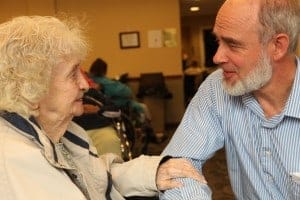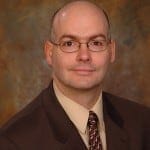
By Daniel Casciato
A survey conducted a few years ago by the National Center for Health Statistics and National Center for Complementary and Alternative Medicine found that for more than 31,000 adults, prayer was the most commonly used practice among all the approaches mentioned in the survey.
In the world of health care today, there are many people who work in the field who believe that spirituality can co-exist peacefully with the analytical, scientific perspective we’ve had on human health for many years. For Chaplain William Johnson (fondly known as Chaplain Bill), supervisor of Spiritual Services for LIFE Pittsburgh, a community-based alternative to nursing home care, the best doctors he has known recognize that medicine is not the final word in healing.
“Moreover, health care providers should never assume a God-like role with their patients,” he says. “Studies have shown that prayer plays a role in healing and recovery. At the same time, spirituality should not disparage the healing that science can bring.”
Spirituality is important in Johnson’s professional life. As an ordained Presbyterian minister, he serves other people and he serves the church on behalf of Christ.
“As a Christian, I derive my motivation and my values from Christ,” he says. “The perspective of one’s faith should help the provider maintain perspective and balance, stay humble, and be mindful of the needs of clients and fellow workers. Simple disciplines like taking breaks, getting needed rest, seeing life and people as God’s gifts, and being ready to laugh at oneself and laugh with others can be fed by faith.
LIFE Pittsburgh is a program of all-inclusive care for the frail elderly which seeks to keep all disciplines of care integrated and coordinated as it supports all aspects of its clients’ lives.
“I see people of faith deriving comfort and motivation for recovery from their faith,” explains Johnson. “I also see them deriving strength for maintaining a healthy degree of independence, which is part of our goal and name [LIFE = Living Independence For the Elderly].”

Spirituality is also important to Dianna Wentz who serves as one of three Spiritual Care Coordinators for Gateway Hospice in Pittsburgh. As a Lutheran minister, she also supplies preach and lead worship services when called upon to do so by the synod.
“Spirituality is my professional and personal life,” she says. “A patient needs a visit and a visit can take any forms. We can discuss soap operas, family, current events, their worries or concerns, anything and everything they want to talk about. Sometimes, especially as a patient declines, little conversation with words is possible. A ministry of presence is simply being there. My faith calls me to serve as Christ’s hands and feet going to those in need at times of peril, fear, loneliness, where/whenever the need may be. Attending to what the patient or family member may or may not be saying, yet feeling, is to focus on their spiritual need.”
Johnson believes that health care providers and institutions can do more to acknowledge and allow for the practice of the faith of their clients and workers and to seek to consistently account for the role of faith in devising and implementing care plans.
“I would encourage clients and health care providers to integrate their faith with their daily life and work, while respecting differences in faith, can contribute to healthy healing and working environments,” he says.
As Wentz sees it, God gives every person a set of gifts or tools to help those around them.
“Some have medical gifts and skills,” she says. “I suggest seeing one’s place of service precisely as the spiritual gift that person is giving to the patient. No one, not even the best doctors, cares for a patient all on their own. God gifts that one to serve those in need. And, God places a team around that person to better serve the patient or family in need.”
Wentz believes that a person’s spirituality does not just come from religion.
“People can be very spiritual, or religious, about the Steelers, for example, or about how they wash their car,” she says. “Spirituality, in a nutshell, refers to how we connect with something beyond ourselves. Medicine is connecting something to our bodies as they heal or as illnesses are addressed—be it medicine, therapy, or surgery. Interweaving the two, thinking about how we connect to something other than ourselves, gives us a blueprint for connecting to something like medicine.”

Dr. Maria Higgins, owner of Optometric Associates of Pittsburgh, has a mostly global view on spirituality. She believes that respecting and honoring each person’s faith as it pertains to their individual care is most important.
“I am a spiritual person without a defined religion, so my views are mostly general and about doing unto others as they would like to be treated,” she says.
Dr. Higgins tries to be open to all possibilities of caring for a patient and all reasons that patients attribute to their healing or good fortune.
“Some patients have asked me about my choice of religion and I answer honestly and say that I am open to all, but defined by none,” she says. “Some have indicated that they praise God for their healing and some believe God has nothing to do with it. I have had some patients mention that they pray for me and that makes me happy—as I need all the help I can get.”
She believes that spirituality in the health care setting must be dealt with on an individual basis.
“Religion and spirituality is so personal that it cannot be blanketed by a statement that would cover all cases,” she says. “So the role it plays in health care is ever-changing, depending on the patient.”
She adds, “I believe that the doctor’s spirituality affects their character and how they conduct themselves throughout the day, which is the background to patient care, but in the exam room, it should be about what speaks to the patient. What I believe is irrelevant when it comes to making the patient feel better.”
In the field of health care, Dr. Higgins believes that spirituality can co-exist peacefully with the analytical, scientific perspective we’ve had on human health for many years.
“We have seen all the damage that stress can do to the body and stress is based on an emotional state,” she says. “Spirituality is the same. It is based on emotion and that has everything to do with a patient’s wellness.”
Dr. Higgins sees spirituality and health care becoming more integrated in the future.
“I think it will become more and more common, in the same way that more holistic/nutrition-based/alternative approaches to wellness and recovery have become more commonplace,” she says. “I think that health care will become less and less viewed as a sterile, unyielding, scientific, myopic profession and more viewed as a broad healing profession in both the mental and physical arenas, catering to the patient as a whole.”

Dr. Randy Hebert agrees.
“I think this is a greater realization in general by the medical community that patients are more than a collection of molecules and organs,” says Dr. Hebert, medical director of Forbes Hospice. “Holistic medicine is a buzzword that refers to the care of the total patient. Religion and spirituality can play a part in this care.”
Dr. Hebert tries to be very in tuned to a patient’s and their family’s religion. Specifically, he looks for signs of religion or spirituality such as bibles, religious and artifacts as well as listens for signs like the mention of God, faith, or church.
“I try to determine whether religion/spirituality plays a part in these peoples’ lives,” he says. “When I comment on these issues in a sensitive manner, I think the patients and families like it. It shows that I’m paying attention to them in more than a medical manner.”
Spirituality will always play an important role in the practice of medicine.
“Although lots of surveys comment that Americans may be less enmeshed with traditional religion than they were years ago,” says Dr. Hebert, “most patients and families I speak to comment on things like hope and faith. These are topics that are definitely related to spirituality and play a large role in how people cope with the illness.”
He adds, “Spirituality can also help physicians to step back and take stock in why we are here. We sometimes get so busy in the mundane/day-to-day of our work that we sometimes loose sight of the fact that we are in medicine to help people. Religion and spirituality can help ground us.”.
Throughout the year, our writers feature fresh, in-depth, and relevant information for our audience of 40,000+ healthcare leaders and professionals. As a healthcare business publication, we cover and cherish our relationship with the entire health care industry including administrators, nurses, physicians, physical therapists, pharmacists, and more. We cover a broad spectrum from hospitals to medical offices to outpatient services to eye surgery centers to university settings. We focus on rehabilitation, nursing homes, home care, hospice as well as men’s health, women’s heath, and pediatrics.







